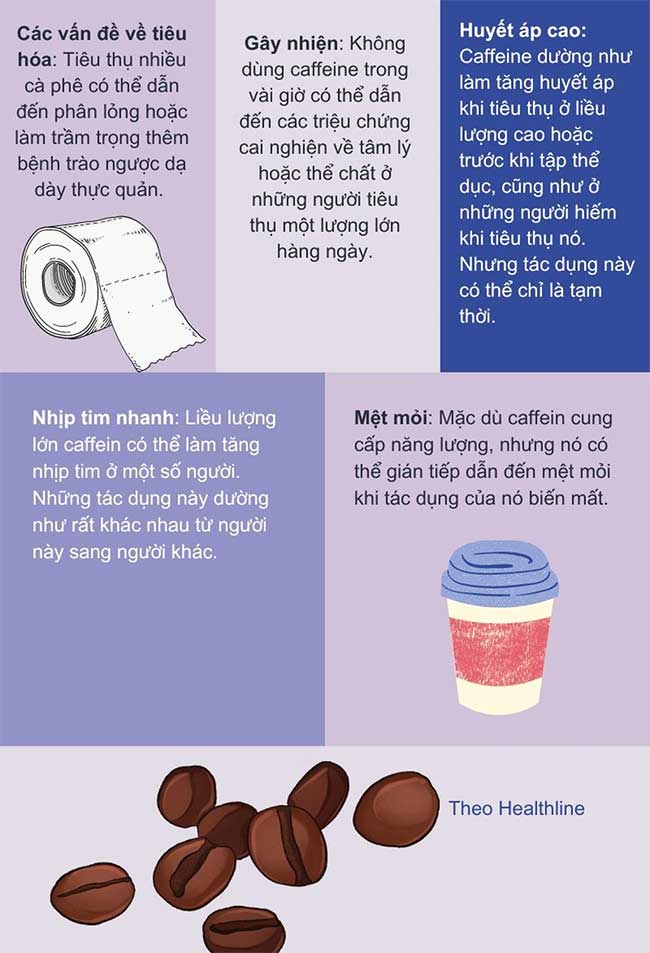Scientists have discovered that regularly drinking coffee or tea offers numerous health benefits. So, which is better for your health: coffee or tea?
Source of Fiber
A study shows that on average, coffee contains between 1.1 to 1.8 grams of fiber per cup, depending on whether it is filtered coffee, espresso, or instant coffee. That may not sound like much, but it contains more fiber than you would find in orange juice, which has about half a gram of fiber per cup.
On the other hand, a cup of tea will typically not help you meet your daily fiber needs, of course, unless you decide to chew the tea leaves.
Therefore, in this aspect, coffee has the advantage.
Focus Ability
The caffeine in both coffee and tea helps enhance focus. Studies show that caffeine can improve attention, alertness, and wakefulness, but too much caffeine can lead to restlessness and excessive excitement, which may affect your performance.

Coffee and tea are both healthy beverages (Photo: Getty Images).
The amount of caffeine in coffee and tea can vary widely depending on many factors. According to Mayo Clinic, a 240ml cup of brewed coffee contains about 100 milligrams of caffeine, while a 240ml cup of black tea has about 50 milligrams of caffeine.
So, which is better, coffee or tea? One study had participants drink 4 cups of coffee or tea throughout the day. Both beverages had similar effects on alertness and cognitive performance. However, tea has a significant advantage over coffee: it contains enough caffeine to support performance without being excessive enough to disrupt sleep.
At this point, tea has the advantage.
Good for Gut Microbiota
According to The Washington Post, both coffee and tea are rich sources of polyphenols, plant compounds that offer many health benefits. Research shows that polyphenols can reduce the risk of developing chronic diseases and serve as fuel for beneficial bacteria that make up your gut microbiota.
Coffee has significantly more polyphenols than green tea, and green tea contains more polyphenols than black tea. In fact, there are specific bacteria that seem to thrive in individuals who consume a lot of coffee. Scientists did not find the same effects in tea drinkers.
Thus, in this aspect, coffee has an advantage over tea.

Coffee is a popular drink particularly good for the liver (Photo: N.P).
Reduced Risk of Cardiovascular Disease
Extensive research suggests that both coffee and tea are good for the heart, reducing the risk of heart disease and stroke.
However, these studies are not conclusive; coffee and tea drinkers may engage in other heart-healthy habits, such as exercising more or having healthier diets. It seems that the antioxidants and polyphenols in both coffee and tea help protect cardiovascular health.
Clinical trials have shown that regular tea consumption, especially green tea, can slightly improve blood pressure and cholesterol levels. Drinking decaffeinated coffee—about 2 to 4 cups a day—is also linked to a reduced risk of heart disease.
This suggests that any cardiovascular benefits from drinking coffee and tea may stem from compounds other than caffeine.
Thus, in this aspect, the benefits of both beverages are equal.
Lower Cancer Risk
Many studies have found that coffee drinkers have a lower incidence of cancer. One meta-analysis of 59 studies across 40 groups showed that regular coffee drinkers had a 13% lower risk of cancer compared to those who rarely or never drank coffee.
Regular coffee consumption may help protect against colon, prostate, liver, endometrial, oral, and breast cancers.
The American Cancer Society states that coffee contains hundreds of bioactive compounds, including some that have been shown to reduce inflammation, prevent cell damage, and regulate genes related to DNA repair.
Studies on tea have not yet clearly shown this link. Thus, in this aspect, coffee has an advantage.
Type 2 Diabetes
A cup of coffee may cause a short-term spike in blood sugar levels due to its caffeine content. However, large studies show that regular coffee drinkers are less likely to develop type 2 diabetes.
Associate Professor Marilyn C. Cornelis, a preventive medicine expert at Northwestern University, suggests that this may be due to the high concentration of chlorogenic acid in coffee, a type of polyphenol that some studies have shown to improve insulin sensitivity and control blood sugar levels.
A meta-analysis involving over 1 million people found that those who consumed up to 4 cups of coffee daily had a 25% lower risk of diabetes compared to those who drank little or no coffee.
While tea does not contain chlorogenic acid, it does have other plant compounds believed to be beneficial for blood sugar control. However, studies examining the relationship between tea consumption and diabetes risk have produced conflicting findings.
Some suggest that drinking 4 or more cups of green, black, or oolong tea daily may reduce diabetes risk. A meta-analysis of randomized trials indicated that green tea may lower blood sugar levels. Yet other studies found no clear link between tea and diabetes risk.
Ultimately, experts believe that evidence suggests coffee may provide at least some stronger protective effects against diabetes compared to tea.
Stress Levels
If you are looking for a soothing and gentle drink that may even help reduce stress, tea is a good choice. Studies have found that when people are stressed, drinking green or black tea can help them feel more relaxed and lower cortisol levels, the stress hormone.
This is partly due to L-theanine, a compound found in tea—especially green and black tea—that appears to promote relaxation.
Compared to tea, coffee has a much higher caffeine content and caffeine stimulates cortisol levels and elevates your mood. Too much caffeine can also cause restlessness, anxiety, and insomnia.
Thus, if you want to relax, a cup of tea is the safest choice for you.

Tea is considered a longevity drink (Photo: Getty Images).
Longevity
People who drink coffee and tea tend to live longer than those who do not consume either beverage.
For tea drinkers, both green and black tea are associated with longevity. In a recent study, scientists tracked half a million people over 14 years and found that those who drank at least two cups of tea daily had a 9% to 13% lower risk of dying during the study period compared to those who did not drink tea.
Black tea, especially green tea, is rich in polyphenols and other beneficial compounds. These compounds have the potential to reduce stress and inflammation in the body.
For coffee, a study in July tracked nearly 172,000 people and found that those who consumed 2.5 to 4.5 cups of coffee daily had a 30% lower risk of dying over approximately 7 years compared to those who did not drink coffee.
In this respect, both beverages offer equal benefits.
So, is tea or coffee better?
With the comparisons above, coffee currently has the edge. Coffee drinkers may boost fiber intake, gut microbiota health, and reduce the risk of cancer and diabetes. Meanwhile, tea is undoubtedly beneficial for blood pressure, cholesterol, stress levels, mental health, and productivity.
Both beverages are good for cardiovascular health and longevity, and especially for tea, there may be even more health benefits.
Nonetheless, experts suggest that one reason coffee provides more health benefits than tea is that it has been studied more extensively.
However, if you are not a coffee or tea drinker, don’t feel pressured to change. The Dietary Guidelines for Americans state that those who do not drink coffee or tea are not encouraged to start. Water and pure or flavored milk are also good health choices.
One final consideration in the battle of tea versus coffee is popularity. It is estimated that the world drinks three cups of tea for every cup of coffee. And tea is the second most consumed beverage in the world (the first is water).





















































